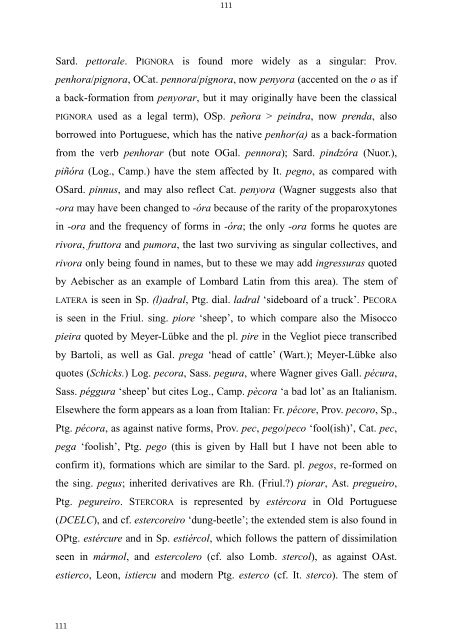The Latin Neuter Plurals in Romance - Page ON
The Latin Neuter Plurals in Romance - Page ON
The Latin Neuter Plurals in Romance - Page ON
Create successful ePaper yourself
Turn your PDF publications into a flip-book with our unique Google optimized e-Paper software.
111<br />
111<br />
Sard. pettorale. PIGNORA is found more widely as a s<strong>in</strong>gular: Prov.<br />
penhora/pignora, OCat. pennora/pignora, now penyora (accented on the o as if<br />
a back-formation from penyorar, but it may orig<strong>in</strong>ally have been the classical<br />
PIGNORA used as a legal term), OSp. peñora > pe<strong>in</strong>dra, now prenda, also<br />
borrowed <strong>in</strong>to Portuguese, which has the native penhor(a) as a back-formation<br />
from the verb penhorar (but note OGal. pennora); Sard. p<strong>in</strong>dzóra (Nuor.),<br />
piñóra (Log., Camp.) have the stem affected by It. pegno, as compared with<br />
OSard. p<strong>in</strong>nus, and may also reflect Cat. penyora (Wagner suggests also that<br />
-ora may have been changed to -óra because of the rarity of the proparoxytones<br />
<strong>in</strong> -ora and the frequency of forms <strong>in</strong> -óra; the only -ora forms he quotes are<br />
rivora, fruttora and pumora, the last two surviv<strong>in</strong>g as s<strong>in</strong>gular collectives, and<br />
rivora only be<strong>in</strong>g found <strong>in</strong> names, but to these we may add <strong>in</strong>gressuras quoted<br />
by Aebischer as an example of Lombard <strong>Lat<strong>in</strong></strong> from this area). <strong>The</strong> stem of<br />
LATERA is seen <strong>in</strong> Sp. (l)adral, Ptg. dial. ladral ‘sideboard of a truck’. PECORA<br />
is seen <strong>in</strong> the Friul. s<strong>in</strong>g. piore ‘sheep’, to which compare also the Misocco<br />
pieira quoted by Meyer-Lübke and the pl. pire <strong>in</strong> the Vegliot piece transcribed<br />
by Bartoli, as well as Gal. prega ‘head of cattle’ (Wart.); Meyer-Lübke also<br />
quotes (Schicks.) Log. pecora, Sass. pegura, where Wagner gives Gall. pécura,<br />
Sass. péggura ‘sheep’ but cites Log., Camp. pècora ‘a bad lot’ as an Italianism.<br />
Elsewhere the form appears as a loan from Italian: Fr. pécore, Prov. pecoro, Sp.,<br />
Ptg. pécora, as aga<strong>in</strong>st native forms, Prov. pec, pego/peco ‘fool(ish)’, Cat. pec,<br />
pega ‘foolish’, Ptg. pego (this is given by Hall but I have not been able to<br />
confirm it), formations which are similar to the Sard. pl. pegos, re-formed on<br />
the s<strong>in</strong>g. pegus; <strong>in</strong>herited derivatives are Rh. (Friul.?) piorar, Ast. pregueiro,<br />
Ptg. pegureiro. STERCORA is represented by estércora <strong>in</strong> Old Portuguese<br />
(DCELC), and cf. estercoreiro ‘dung-beetle’; the extended stem is also found <strong>in</strong><br />
OPtg. estércure and <strong>in</strong> Sp. estiércol, which follows the pattern of dissimilation<br />
seen <strong>in</strong> mármol, and estercolero (cf. also Lomb. stercol), as aga<strong>in</strong>st OAst.<br />
estierco, Leon, istiercu and modern Ptg. esterco (cf. It. sterco). <strong>The</strong> stem of









